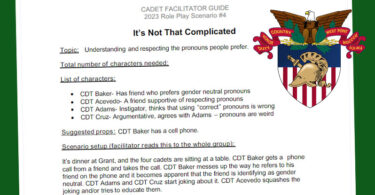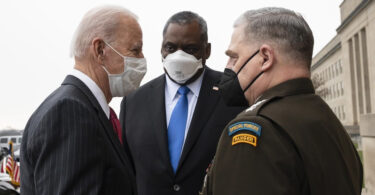By Cami Mondeaux | Washington Examiner
A congressman is pressing the Biden administration to explain how the creation of jobs specializing in diversity, equity, and inclusion is critical to national security as lawmakers await a report from the Government Accountability Office to review the impact of such positions in the Defense Department.
Rep. Jim Banks (R-IN) sent a letter to Defense Secretary Lloyd Austin last week demanding information on whether a DEI hiring freeze has negatively affected the department and hindered officials from responding to foreign conflicts.
The letter, exclusively shared with the Washington Examiner, directly references a measure in the National Defense Authorization Act passed last year that enacted a hiring freeze for new DEI positions until the GAO completes a review of its impact in the military.
The letter comes in response to the DOD implementing a diversity strategic plan, arguing such a move was “the only way … to outthink, outmaneuver, and outfight any adversary or threat.”
The letter specifically pushes against claims by the Biden administration that DEI positions are crucial for national security, with Banks denouncing that argument as an “outlandish claim.”
“The Biden admin has repeatedly claimed that DEI is our military’s greatest strength but has never explained why or how,” said Banks, who serves on the House Committee on Armed Services.
“Since the Biden Pentagon has gone all in on wokeness, our military is smaller and weaker than ever before. The madness must stop! Congress should make the DEI hiring freeze permanent.”
Banks laid out six questions he wants answered by Austin, including information on whether the hiring freeze has affected the DOD’s ability to respond to attacks such as the Houthi drone and missile strikes in the Red Sea as well as a drone strike in Jordan that killed three U.S. service members.
Banks also pressed the DOD on whether the DEI hiring freeze has negatively affected the U.S. military’s ability to curb the flow of fentanyl across the southern border or has increased the likelihood of China invading Taiwan.
“Despite the hiring freeze and a budget cap, the Department has inexplicably requested $162 million for DEI initiatives in Fiscal Year 2025,” Banks wrote in the letter.
“Before Congress spends any more of Americans’ tax dollars on these programs, I believe that the Office of Secretary of Defense must demonstrate their value.”
Banks gave Austin a deadline of April 26 to respond to the letter. The Washington Examiner contacted both the Defense Department and the GAO, but it has not received a response.
First published in Washington Examiner
The Honorable Lloyd Austin
Secretary of Defense
1000 Defense Pentagon
Washington, D.C. 20301
Dear Secretary Austin, I’m writing to you today regarding the national security consequences of Section 928 of the Fiscal Year 2024 National Defense Authorization Act (FY24 NDAA.)
Section 928 of the FY24 NDAA prohibits the Department of Defense (DoD) from either creating any new positions “with responsibility for matters relating to diversity, equity, and inclusion (DEI)” or from filling any vacancies in such positions.
Section 928 took effect on January 1,2024 and will remain in place until the Government Accountability Office (GAO) releases its report on DoD’s DEI workforce.
That report has not yet been provided to Congress.
DoD has made the outlandish claim that diversity is a “strategic imperative critical to mission readiness and accomplishment” and argued that leveraging strategic diversity is the “the only way DoD will be able to outthink, outmaneuver, and outfight any adversary or threat.”
The White House’s Office of Management and Budget made the similarly unsupported allegation that numerous provisions in the House version of the FY24 NDAA aimed at eliminating or scaling back DEI positions and programs at DoD would put our military “at a strategic disadvantage.”
In February 2021, you directed each of the services to participate in a “Stand-Down to Address Extremism in the Ranks.” The stand down wasted nearly 5.4 million man-hours, as DoD was forced to admit it found,
“no evidence that the number of violent extremists in the military is disproportionate to the number of violent extremists in the United States as a whole.”
In September 2022, DoD created the Defense Advisory Committee on Diversity and Inclusion (DACODAI) with the aim of increasing diversity in the military.
Even if DoD were to prove that DEI contributes to our national security, which it has not, DACODAI is clearly duplicative.
When it established DACODAI, DoD already had several active programs with the exact same or similar functions, including an Office for Diversity, Equity and Inclusion, a Civil Rights Program, a Civilian Equal Employment Opportunity and, since 1971, a Military Equal Opportunity Program.
Each of the services have promoted diversity with similar over-enthusiasm and disregard for taxpayers.
For example, the U.S. Air Force created a SAF/DI DEIA Progress Dashboard to evaluate its progress towards achieving diversity goals, the Secretary of the Navy issued a memorandum directing the Chief of Naval Operations to take six immediate actions to advance DEI, and the U.S. Army published a detailed diversity, equity, inclusion and accessibility implementation plan.
Despite the hiring freeze and a budget cap, the Department has inexplicably requested $162 million for DEI initiatives in Fiscal Year 2025.
Before Congress spends any more of Americans’ tax dollars on these programs, I believe that the Office of Secretary of Defense must demonstrate their value.
Therefore, no later than Friday, April 26, 2024, please provide my office with detailed responses to the following questions:
1. How has the DEI hiring freeze affected DoD’s ability to respond to the ongoing Houthi drone and missile attacks in the Red Sea?
2. The US military has conducted over 250 airstrikes against targets in Yemen since Houthi attacks on military and commercial vessels began. Yes or no, would those strikes have been more effective or more numerous, if DoD’s DEI hiring freeze was no longer in effect? If yes, please explain why.
3. How did the DEI hiring freeze affect DoD’s response to the drone strike in January that took the lives of three American servicemembers in Jordan?
4. What has the effect of the DEI hiring freeze been on our military’s ability to stem the flow of fentanyl across our southern border?
5. In DoD’s assessment, has the DEI hiring freeze increased the likelihood of an invasion of Taiwan by the People’s Republic of China?
6. Has DoD conducted any war games simulating a conflict between the U.S. military and the People’s Liberation Army since January 1, 2024?
a. If yes, did DoD factor its DEI hiring freeze into those exercises?
b. If not, why not?
Sincerely,
Jim Banks
Chairman
Subcommittee on Military Personnel








Leave a Comment